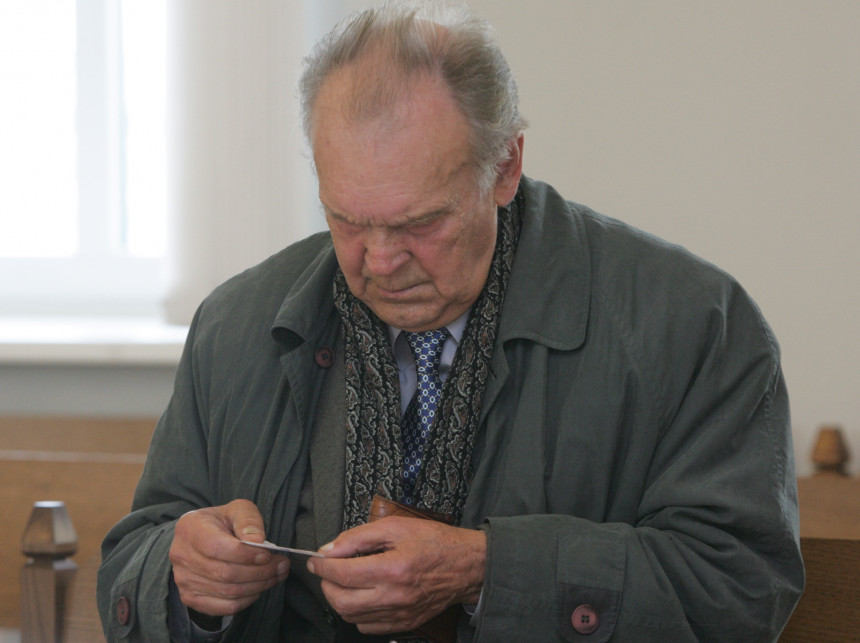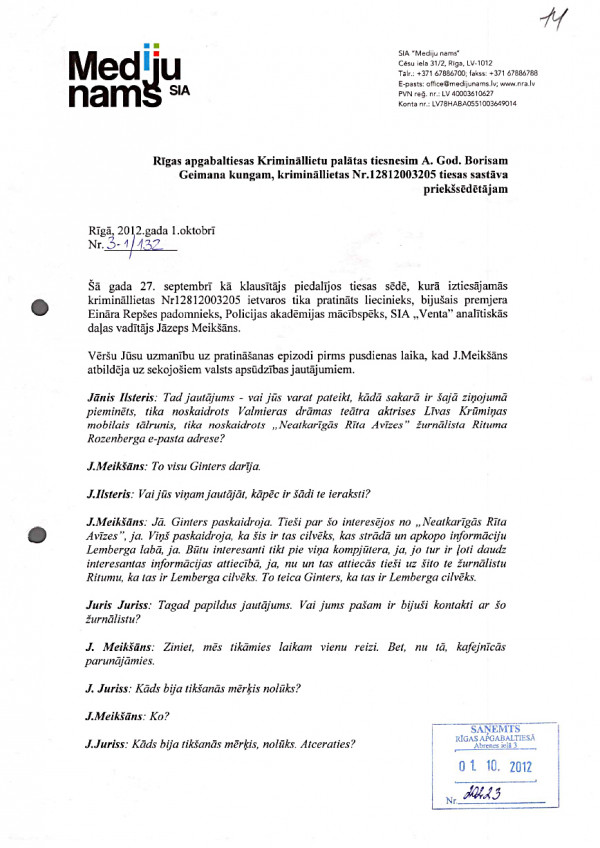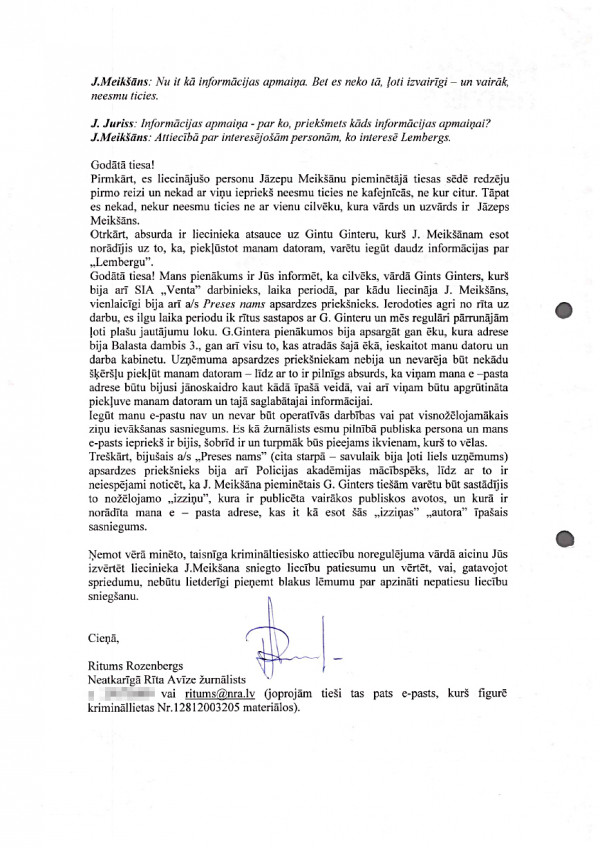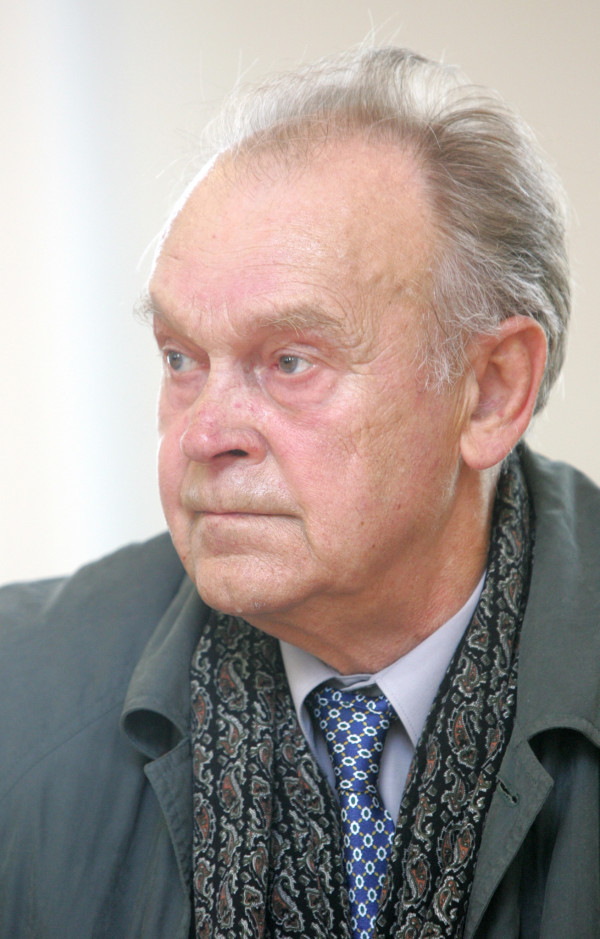To convict and arrest Lembergs even openly false testimony was used

In order to substantiate in the full judgement why Ventspils Mayor Aivars Lembergs was imprisoned after the first instance judgment, Chamber of Criminal Cases of the Riga Regional Court, headed by Judge Irīna Jansone, made the most use of the testimonies of Jāzeps Meikšāns, Adviser to the former Prime Minister Einars Repše, lecturer of the Police Academy and head of the analytical department of the security company SIA Venta, that were not only clearly contradictory, but also outright fabricated and even found by a court judgment to be deliberately false - discovered Neatkarīgā when looking through the full judgment of the Lembergs criminal case.
As is well known, the abbreviated judgment did not state any reason why A. Lembergs was given arrest as a security measure. This provoked public criticism even from persons who could not be called supporters of A. Lembergs - quite the contrary.
Apparently, the court had to find some reasoning, and it was found in the same testimony of J. Meikšāns, on the basis of which A. Lembergs was arrested more than 14 years ago - on March 14, 2007. The court has even ignored the fact that in the meantime at least part of J. Meikšāns' testimonies in another criminal proceeding has been declared deliberately false by the Senate of the Supreme Court (more on that below).
The court has also ignored other facts about J. Meikšāns' testimony.
A complete fabrication

In the autumn of 2012, J. Meikšāns gave oral testimony during the court investigation of the Lembergs case. His testimony during the pre-trial investigation was also read in the courtroom. Neatkarīgā correspondent was in the courtroom during J. Meikšāns' testimony. Listening to this testimony, Neatkarīgā correspondent found that the witness was telling the court a blatant lie that he, J. Meikšāns, had met with one of the authors of this publication, R. Rozenbergs, in a cafe to exchange information allegedly collected in the interests of Ventspils Mayor Aivars Lembergs.
There was a big surprise about what the witness said because R. Rozenbergs had seen J. Meikšāns for the first time in his life only in the courtroom and had never sat with him in any cafes, as the witness claimed to the court. Prior to this court hearing, the journalist had not seen J. Meikšāns even in photographs.
Responding to the blatant lies and relying on an impartial judiciary, Rozenbergs sent an official letter to Judge Boriss Geimans, Chairman of the court that was judging Lembergs. In the letter, the judge was informed that witness J. Meikšāns had given false testimony. R. Rozenbergs did not receive any answer from the court. R. Rozenbergs did not send a follow-up letter, relying on the court to critically evaluate the mentioned witness testimony, as required by law.

However, it was once again a big surprise to see the full text of the 1920-page judgement, where on page 939 the same lies of J. Meikšāns are brought to light as important evidence of A. Lembergs' guilt: “The witness testified that he knew that journalist Ritums Rozenbergs is the person who works and collects information for Lembergs, this journalist Ritums is Lembergs' man. He himself has met this journalist maybe once, they talked in a cafe. The purpose of the meeting was to exchange information, but they were very evasive. They hadn't met after that."
It is significant that the judgement does not include the excerpt of J. Meikšāns' testimony given during the pre-trial investigation and repeated during the court investigation about his own report, how successful he was allegedly spying for A. Lembergs. In that report, the following success of J. Meikšāns' operative work was revealed: "The mobile phone of Valmiera Drama Theater actress Līva Krūmiņa was discovered (..) The e-mail address of the journalist Ritums Rozenbergs of the Neatkarīgā Rīta Avīze was discovered."
Although immediately after reading this excerpt from previous testimonies, J. Meikšāns gave false testimony in court about contacts with a journalist, the court has kept it secret. Apparently, even the court understands - what would be the point to spy on behalf of A. Lembergs to get the e-mail address of "Lembergs' man", especially if it was and still is publicly available?
Among other things, R. Rozenbergs did and still does collect information on behalf of each of his readers, including A. Lembergs. R. Rozenbergs compiles everything, critically evaluates it and then presents it to his readers, publishing it on the websites neatkariga.lv and nra.lv.
As for the espionage of A. Mežsargs, the truth about this issue was not clarified either during the pre-trial or court investigation. But the question remains, who spied on whom - J. Meikšāns on A. Mežsargs or A. Mežsargs on R. Rozenbergs and the very J. Meikšāns?
The truth is that a very close relative of A. Mežsargs worked in a high position in JSC Preses nams, and a subordinate of A. Meikšāns was the security chief of JSC Preses nams, who had very wide opportunities to obtain information about the journalist, including through completely legal methods.
Bond-like
Even without R. Rozenbergs' letter, the court had to be especially critical of J. Meikšāns' testimony. J. Meikšāns was used as a false witness for the first time in the so-called Operation Kurmis criminal case.
In 2007, Lieutenant Colonel Arnis Indriksons, the Chief of the 1st Department of the Security Police, was accused of espionage also allegedly on behalf of A. Lembergs. However, the Lieutenant Colonel was acquitted in all three instances, and the court found that J. Meikšāns' testimony was deliberately false.

Nevertheless, in the Lembergs case, J. Meikšāns largely repeated what he said in the Operation Kurmis case about his activities in the security company Venta, where he allegedly collected information about Ventspils businessmen, politicians, A. Mežsargs, actors and journalists on behalf of Ventspils Mayor Aivars Lembergs.
Accordingly, the task was given to him not by A. Lembergs himself, but by the head of the security company Venta, former head of the Riga Criminal Police Aivars Valcis. J. Meikšāns himself has met A. Lembergs only once, but the meeting was disappointing because A. Lembergs ate lunch and did not listen to what J. Meikšāns said.
Testifying in court, J. Meikšāns for a moment claimed that he had categorically refused A. Valcis' call to spy on prosecutor A. Mežsargs. In another place, J. Meikšāns claimed that he had personally compiled very serious inquiries about the suspicious contacts of prosecutor A. Mežsargs with Chechen businessmen and their friends; had personally interviewed the employees of the police and other law enforcement institutions about these contacts of A. Mežsargs; personally organized the publishing of information about A. Mežsargs' contacts with the Chechens in the newspaper Čas, etc.
In the full court judgment of the Lembergs case, these contradictions are not analyzed at all in the testimony of J. Meikšāns - both variants are simply retold.
They also retell the testimonies of J. Meikšāns (at that time he was an adviser to Prime Minister E. Repše) about how he urged Aleksejs Loskutovs to become the head of KNAB and for that organized A. Loskutovs' meeting with A. Lembergs.
Respectively - it turns out that no one else but Jāzeps Meikšāns is the “godfather” of Aleksejs Loskutovs, thus he has, at least a little, decided the fate of Latvia!
Among other things, in addition to the criminal proceedings described here, there are also stories that J. Meikšāns spied on the Deputy Chief of the Security Police Didzis Šmitiņš, which cost D. Šmitiņš his job, and the politician Andris Šķēle.
What other courts reject, this one welcomes
The main purpose of the indictment against Arnis Indriksons was to discredit A. Lembergs with the help of witness J. Meikšāns, to justify the necessity of A. Lembergs' arrest to the investigating judge in March 2007.
However, these allegations could have other purposes, as the removal of Security Police Lieutenant Colonel A. Indriksons also destroyed his successful investigation into the giant thefts from the diesel pipeline. At that time, the losses of diesel in the pipeline were so great that it was suspected that they were not thefts of bandit drilling in the pipeline, but rather manipulations of measurements. Consequently, suspicions fell on influential officials of JSC Ventbunkers, who at that time were called “Lembergs' opponents”.
On January 14, 2008, the Riga Center District Court acquitted Lieutenant Colonel A. Indriksons, and the court's judgment reflected that J. Meikšāns had deliberately given false testimony. "I have been working in the police for almost 20 years, but I have never seen the prosecutor's office bring a case based only on nonsense," A. Indriksons himself admitted in an interview with Neatkarīgā at that time.
The prosecutor's office filed an appeal, but lost in the Riga Regional Court as well. And on August 29, 2008, the Senate of the Supreme Court dismissed the indictment in its entirety, leaving the judgment of the Riga Regional Court unchanged.
Following the decision of the Senate of the Supreme Court, A. Indriksons applied to the Security Police with an application regarding the initiation of criminal proceedings against J. Meikšāns for deliberately giving false testimony, which was recognized by a court decision. The Security Police forwarded the application to the Prosecutor General's Office. On October 30, 2008, without any real motivation, the Prosecutor of the Pre-trial Investigation Supervision Division of the Criminal Law Department of the Prosecutor General's Office Anita Cēsniece made a decision to refuse to initiate criminal proceedings.
The prosecutor's decision was appealed to Chief Prosecutor Arvīds Kalniņš, who also rejected the complaint, stating that "inaccuracies" in J. Meikšāns' testimony arose due to "the effect of age on his memory".
Finally, on November 28, 2008, A. Indriksons sent a complaint to Prosecutor General Jānis Maizītis requesting to annul the decisions of Prosecutor A. Cēsniece and Chief Prosecutor A. Kalniņš and to initiate criminal proceedings against J. Meikšāns, as they were not just some "inaccuracies" in the evidence if even the court admitted that the evidence had been deliberately false!
Furthermore, "an elderly person is also a subject of the criminal offenses provided for in Articles 298 and 300 of the Criminal Law, in other words, false statements and testimonies must not be given." However, the Prosecutor General also protected J. Meikšāns, most likely as a witness who had given incriminating testimony against A. Lembergs.
Lemberg goes to prison for Meikšāns' lies
In the long text of the 1920 pages of the full judgment in the Lembergs' criminal case, only 2.5 pages are devoted to applying arrest as a security measure. It revealed that one of the three grounds for the arrest was, among other things, the testimony of J. Meikšāns regarding the espionage of A. Mežsargs: “Thirdly, the court takes into account the circumstances of the commission of a criminal offense established and proved during the court investigation regarding the manner in which the accused Aivars Lembergs has tried to influence both the prosecutors and the witnesses - by threatening, by doing public campaigns to damage to their reputation. The materials of the case contain evidence of purposeful targeted espionage of the facilitator of the process (prosecutor A. Mežsargs) by the accused, illegally collecting information about him, trying to achieve the desired results of the criminal proceedings. It was possible for the accused Aivars Lembergs to perform such actions using his influence on certain officials in law enforcement institutions (Corruption Prevention and Combating Bureau, Security Police, State Revenue Service, State Police, etc.). In view of the above, the court considers that there are grounds to apply arrest as a security measure to the accused Aivars Lembergs, as another security measure cannot ensure that the accused Aivars Lembergs will not interfere or avoid the execution of the judgment.”
It should be reminded that so far no illegal espionage of A. Mežsargs has been established in any instance. As can be seen, no specific law enforcement officials are mentioned in the judgment either.
If the former Security Police Lieutenant Colonel Arnis Indriksons, the former head of the KNAB Aleksejs Loskutovs and the former lecturer of the Police Academy Jāzeps Meikšāns are meant by the influenced officials in law enforcement institutions, then the question is why it has not been properly investigated and a person can still be imprisoned based only on J. Meikšāns' contradictory and false testimonies?
As for the court's assertion that A. Lembergs could evade trial, it should be emphasized that during the 12 years of proceedings, A. Lembergs had not unduly delayed any court hearings, has traveled around the world with the court's permission, including to exotic countries and countries where it would be easy to disappear (for example, Uzbekistan). A. Lembergs has also always emphasized his trust in an impartial and fair trial. Must have been wrong.
*****
Be the first to read interesting news from Latvia and the world by joining our Telegram and Signal channels.
